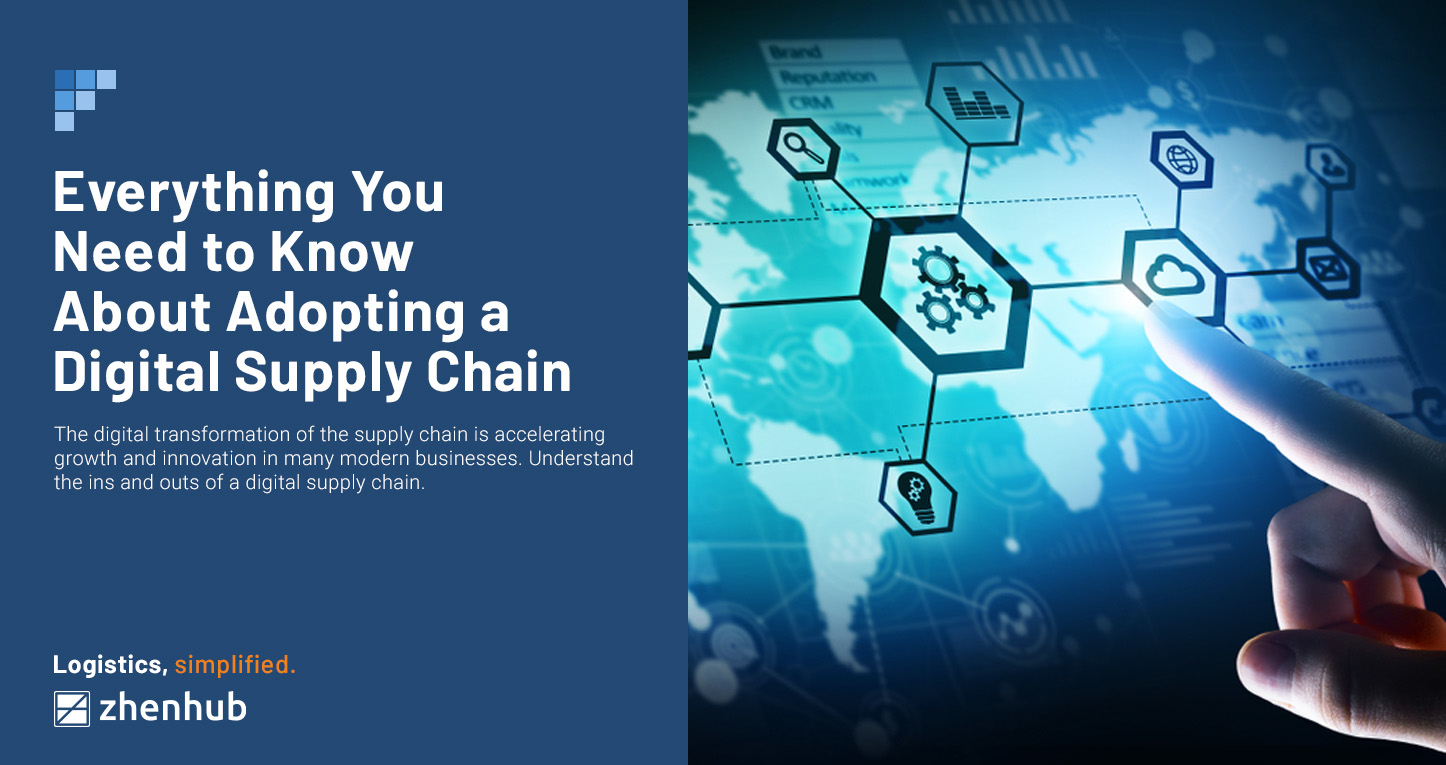
Blockchain Logistics Explained
Time to read: 6 minutes
Blockchain logistics is a new and exciting field rapidly gaining popularity. But what is it exactly, and why should you care? Learn more about this exciting new technology below.
You may have heard of blockchain as an emerging technology trend for the past several years. Simply put, a blockchain is a distributed database or ledger shared among the nodes of a computer network. This database helps store important information electronically in a digital format. Blockchain is famously known for powering cryptocurrency systems and transactions.
What sets it apart from other databases is how data is structured. Information is gathered into sets, which are classified as “blocks.” Certain blocks can have closely linked data to other similar blocks, allowing them to form a chain of data. Information is structured into chunks, creating a decentralized, transparent timeline of data. . User access is collectively shared, and blocks are generally immutable, meaning the data entered cannot be reversed or altered.
Blockchain logistics is a game-changer in improving e-commerce shipping in light of current business challenges, including the ongoing supply chain crisis. Adding digital tools is a cost-efficient way to modernize and future-proof business operations. Keeping your customers happy by offering fast delivery times and items constantly in stock is a great way to stimulate business growth.
How Blockchain Logistics Works
The logistics industry faces increasing complexity with more parties involved in supply chains. It requires increased communication and end-to-end cross visibility, making the process inefficient for all participants. Businesses should be transparent, reliable & effective to meet their customers’ high expectations.
Logistics companies often struggle with manual processes that are mandated by regulatory authorities. For example, many logistics providers use traditional data entry and paper-based documentation methods. Forty-three percent (43% ) of small businesses don’t track their inventory.
Consumers are usually unaware of where their purchases come from. Products can be inspected or passed around by multiple staff throughout their journey. These all require records that accurately reflect item status and condition at several points in time in different locations. Usually, this is where inefficiencies happen, which can lead to losses and added costs. Even if a single number is off, this can cause massive delays, negatively affecting your bottom line.
With blockchain, shipping companies can improve their efficiency by using a public ledger system that tracks the movements of each container. It also enables them to implement faster routes and cut out unnecessary steps in delivery processes.
In a study conducted by Zion Market Research, it was determined that the use of blockchain technology in the supply chain management market was valued at approximately $262.9 Million in 2021 and is projected to reach roughly USD 3153.7 Million by 2028.
A distributed ledger enhances overall transparency, reduces intermediaries, and helps detect fraud through automatic authentication of sensitive data and documents. Smart contracts can prevent logistics companies from paying hefty paperwork and brokering fees. Instead, they can enter into agreements immediately dissolved if all stipulations aren’t met, thus eliminating the need to go through third-party companies.
Blockchain offers an innovative solution to overcoming today’s logistics problems. It’s a technology capable of creating transparency and access among relevant stakeholders in the supply chain, creating one truth for all parties involved.
Benefits and Challenges for Blockchain Logistics
In the logistics industry, many parties transport goods or products from one place to another. All transactions go through strict documentation for security purposes & ensure trustworthiness.
Logistics can be so much more efficient by introducing new technology that records and keeps track of everything. It can log route information, to costs for each leg on your shipment (or load), all without any need or delay in communication between involved parties. Here are some of the best benefits of introducing blockchain to your logistics.
1. Enhanced supply chain transparency and traceability
Blockchain logistics promotes a single source of truth through integrating immutable data from all possible participants in the supply chain. Being able to monitor the performance history of carriers and suppliers builds stakeholder trust. You’ll also have full access to reliable information about their previous projects and transactions. This contributes to better cooperation between partners as managers and decision-makers have a solid reference point when choosing service providers.
Products come with proof of origin. That includes separate and verified assurances of compliance and safety standards throughout the fulfillment process. Sixty-nine percent (69%) of organizations that use blockchain systems ensure supply chain visibility. It gives them greater oversight and protection against the spread of counterfeit goods alongside improved product integrity.
2. Improved Security and Authentication
The records and data that blockchain technology generates via cryptography are fully secured on an encrypted platform capable of storing and exchanging documents. Their immutable nature makes authentication simple. Every transaction is visible to all participants, and previous data entries cannot be removed or edited. These need to be updated by inputting a new transaction, which can be cross-checked. Fraud is easily detected, and shippers can double specific modifications to documents and transactions.
Blockchain gets secured with comprehensive requirements, detailed information, and rules. Most transactions need photo IDs to proceed, whether pick-up or delivery.
3. Simpler Processes
Blockchains reduce dependencies on intermediaries with peer-to-peer models. Since every involved party can access and validate data, disputes are much easier to resolve as well. Companies can do quality assurance at every step.
It can also automate processes through “smart contracts,” Businesses can do payments, transfer of ownership, cargo checks, and tariff settlement digitally with minimal human intervention. Each step gets followed up by the next one based on the set rules in a contract.
4. Better Operations Efficiency
Business operations can see greater efficiency by cutting down on possible errors and transaction costs. Not only do smart contracts automatically verify all their data, but decentralization also helps avoid repetition. Blockchain also features integration on many Electronic Logging Devices (ELDs), which can update product behavior or driving statistics in real-time.
While blockchain offers exciting opportunities and solutions for logistical problems, there are some hurdles that businesses must overcome.
First is the lack of widespread knowledge and awareness of the blockchain platform. A workforce with limited technical know-how won’t be able to implement and operate a working blockchain structure. Partners may also have apprehensions about using the technology due to a lack of information on how it works.
Integration may also be an issue since there is no “standard” blockchain solution for multiple challenges. As such you may have to contract services from several different providers to serve different parties.
Current blockchain logistics services have specific use cases and requirements limiting their performance for particular organizations.
In terms of regulation, many countries lack a clear legal framework for governing blockchain transactions across various domains. As it is still an emerging trend in logistics, there aren’t many reference points on how to operate and manage blockchain operations properly.
While these hurdles may cause concerns for businesses, it is still worth keeping them in mind and acknowledging the value blockchain can bring to companies for specific use cases and setups.
Implementing Blockchain Logistics in your Supply Chain
Once businesses recognize blockchain as a powerful tool to improve logistics efficiency and create value for all stakeholders, they can begin to craft a strategy to utilize its strengths best. The next step should start with willingness, involving building blockchain knowledge and capability by focusing on driving success in collaboration.
Total reinvention isn’t needed, but you will need to evaluate and approach things with a different way of thinking. Your strategy must address specific issues that blockchain is capable of solving. Consider how these same issues are affecting your contemporaries and competitors.
See how blockchain fits into your current business environment and be ready to address issues along the way. Focus on long-term value as it should be a resource that helps with scalability. Blockchain technology works on the idea of an intensely collaborative network. This collaboration allows different parties to agree on a single solution, creating value for the entire industry. Broadening your network and moving up the value chain opens up many opportunities.
Invest in the education of blockchain technology and its proper implementation. Prepare for any possible risks by adding multiple specialists to your blockchain development team. These can range from legal to cybersecurity experts. Consider privacy implications and constantly consolidate with regulators and other industry groups as doing so build greater trust and shapes the best practices for others to follow. According to Deloitte, 68% of executives believe data security and privacy are the areas in greatest need of modification to help boost blockchain adoption.
Stakeholders are instrumental to the success of any blockchain logistics adoption project. Not only do they have a say in implementation, but their participation is key for maximizing benefits and minimizing drawbacks of this new technology.
As with any transformational change, there’s always going to be something that doesn’t go according to plan. However, you can ensure maximum customer satisfaction while adequately dealing with potential risks by working closely with stakeholders during every step. And this collaboration works, whether big or small, throughout an enterprise integration cycle.
With new challenges business supply chains and logistics face every day, it’s worth exploring every opportunity available. Blockchain has great potential in the logistics industry. While it is still generally unknown by many businesses, collaboration can lay the groundwork for the future of progressive value-driven operations.
ZhenHub is an eCommerce fulfillment company that can help your businesses keep up with the rapid digital developments in the eCommerce industry. By combining the power of tech, data, and infrastructure, we can make logistics a seamless experience for online merchants. Get started with our comprehensive platform by signing up at our website.


